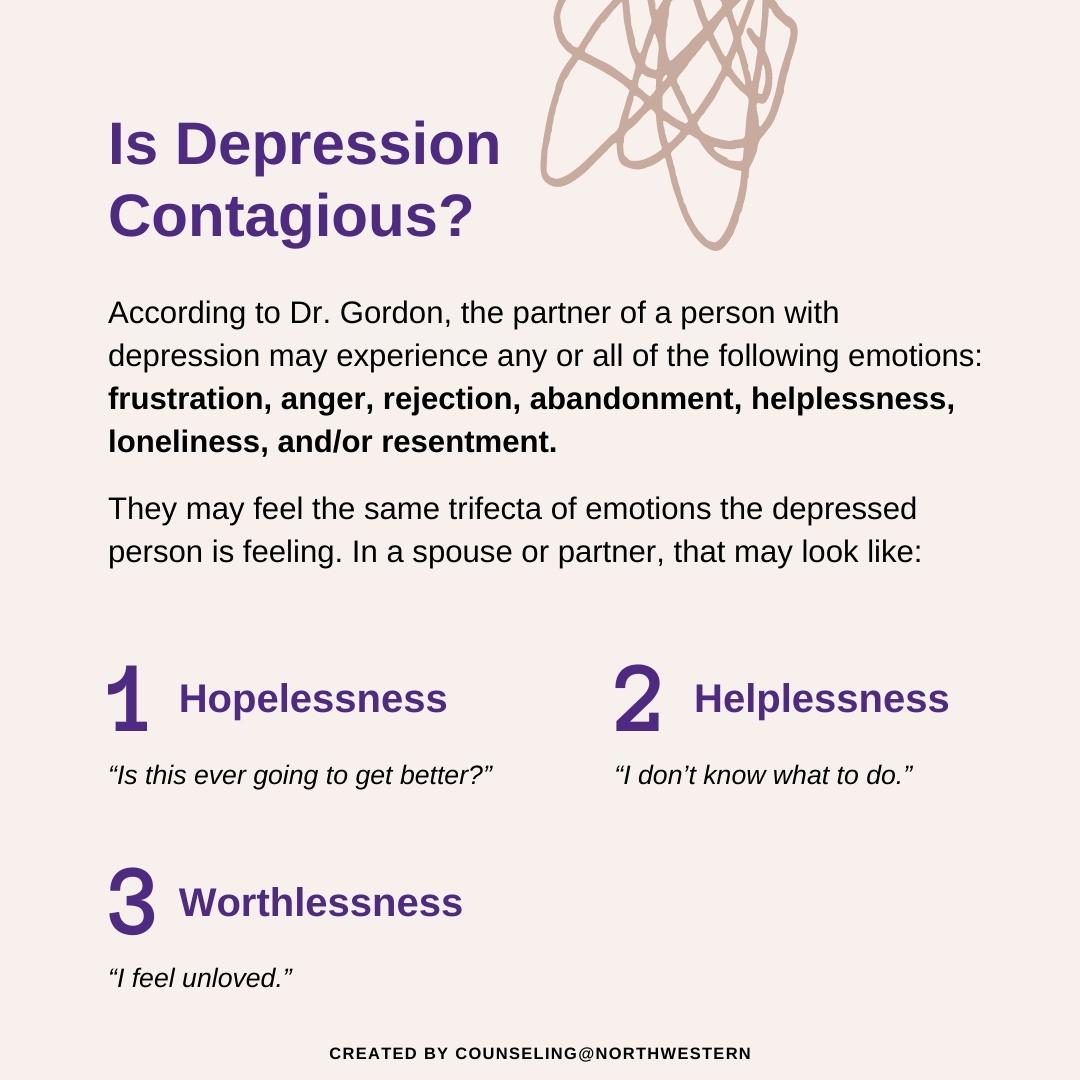Treating Depression in Couples

Throughout the pandemic, the physical, emotional, and mental stressors that individuals were forced to encounter on a daily basis resulted in the prevalence of depression symptoms increasing threefold among US adults. With people forced into close quarters for months on end, many individuals who were able to endure these stressors without developing symptoms saw spouses and partners begin to exhibit signs of depression. And as many learned, when one person in a couple is suffering from depression, both people can be affected.
“Depression is not a weakness. It’s not your fault,” said Dr. Lisa Gordon, a clinical psychologist, in a webinar that she recently hosted for The Family Institute at Northwestern University. “It’s an illness that happens, especially in response to stress.”
Dr. Gordon is a clinician who specializes in treating couples’ distress through the cognitive behavioral therapy (CBT) framework. CBT is a form of talk therapy that focuses on the relationship between emotions, thoughts, and behaviors. This type of therapy seeks to identify negative, irrational, or harmful thoughts and use strategies to challenge and overcome them.
“It provides a good framework for both describing the experience of depression, as well as mapping a pathway out of depression,” she said.
What Does Depression in a Loved One Look Like?
According to Dr. Gordon, there are two common types of thoughts caused by depression:
Catastrophic predictions
“I’ll get fired.”
Harsh self judgments
“I’m a failure.”
“These thoughts are sticky. They’re hard to swat away,” Dr. Gordon said. “So the person with depression can look distracted, preoccupied, even self-absorbed.”
These thoughts can also be a catalyst for experiencing a particularly challenging trifecta of emotions:
Hopelessness
“Nothing will work. This will never get better.”
Helplessness
“I can’t. I feel paralyzed.”
Worthlessness
“I’m a loser. What’s wrong with me?”
The person diagnosed with depression may appear sad, despondent, fatigued, and irritable, which can result in behavioral changes like sleeping too much or too little, binging on comfort foods or experiencing a loss of appetite, and lashing out at their partner or withdrawing. They may turn to harmful coping mechanisms, which can include anything that makes them feel better, such as excessive gaming, gambling, pornography consumption, substance use, or other maladaptive behaviors.
How to Address a Partner’s Depression
It can be difficult to know how to talk to a loved one diagnosed with depression without making them feel labeled or defensive, Dr. Gordon acknowledged. Most people have one of two responses to a depressed partner: fight or flight.
Fight vs. Flight Reactions to a Partner with Depression:

Fight
Shaming, criticizing, blaming, lecturing, or excessively giving advice

Flight
Avoiding, ignoring, shutting down, or even leaving the relationship
It’s important to remember that a person with depression is exhibiting symptoms of an illness, Dr. Gordon said. She compared it to a cough or cold: “You probably wouldn’t say, ‘Why is your nose running?’ or ‘You shouldn’t be coughing.’ It’s the same idea with these emotional symptoms of depression.”
In couples in which one partner is experiencing depression, Dr. Gordon shared the three common options for treatment:
1
The individual diagnosed with depression seeks therapy.
2
Their partner seeks therapy. The focus is on them and what they can control.
3
The couple seeks therapy together. In this model, the couple conceptualizes depression as an intruder on both people, Dr. Gordon explained. The couple is a single team against that intruder.
Is Depression Contagious?
According to Dr. Gordon, the partner of a person with depression may experience any or all of the following emotions: frustration, anger, rejection, abandonment, helplessness, loneliness, and/or resentment.
They may feel the same trifecta of emotions the depressed person is feeling. In a spouse or partner, that may look like:
- Hopelessness: “Is this ever going to get better?”
- Helplessness: “I don’t know what to do.”
- Worthlessness: “I feel unloved.”
Dr. Gordon offered this advice to partners: “Try to find a balance between being supportive and stepping back to fill yourself up with other people or activities.”

How Couples Can Navigate Depression in Their Relationship
Because the thoughts and feelings associated with depression can be very pervasive and draining, it can be challenging for couples to maintain their usual responsibilities, activities, and connection, Dr. Gordon said. A depressed person may lack the energy or interest to do things they previously enjoyed.
CBT for couples supports increasing activity any way that appeals to both people, whether that’s parenting, social interaction, exercise, travel, household duties, volunteering, or other activities.
The concept is called behavioral activation.
“We have a lot of research that tells us if we can get individuals with depression to increase activity, whether or not they want to, it improves mood,” Dr. Gordon said.
She gave some examples of what couples might explore in CBT, such as:
Renegotiating household duties and parenting responsibilities.
This allows the person diagnosed with depression to participate however they feel able. For example, a parent might read their kids a book if taking them on a bike ride is too much.
Considering different ways to maintain intimacy and connection.
Dr. Gordon noted that intimacy can be thrilling and passionate, and it can also be comforting and reassuring. “Look at intimacy across the spectrum, from affection to sex. Where on that continuum can both partners get comfortable?”
Creating rituals to notice the positive.
In depression, the tendency is to notice the negative. So we have to intentionally notice the positive and create rituals to do so, she said. This could be a gratitude journal or a dinnertime ritual of going around the table and sharing what each person was proud of that day.
Taking small steps toward recovery.
“Depression is debilitating,” said Dr. Gordon. It can be unrealistic or unhelpful to talk about getting “all better” or “back to normal.” Instead, consider small steps. For instance, date night may no longer mean going to dinner and a show downtown. It may look like blowing bubbles on the back patio for 20 minutes or going to the store to pick out different flavors of hot chocolate to sample together.
“As hard as it is, try to compartmentalize the depression,” Dr. Gordon said. “The depression is a part of your significant other, not the entirety. The depression is part of your relationship, not the entirety.”
This article is for informational purposes only. If you or a partner are experiencing depression, reach out to a licensed mental health professional for help.
Citation for this content: Counseling@Northwestern, the Online Master of Arts in Counseling Program from The Family Institute at Northwestern University.

